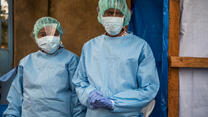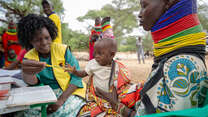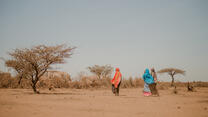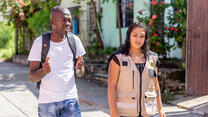The International Rescue Committee (IRC) is pleased to welcome the political declaration renewing the call to action against antimicrobial resistance. We are particularly excited at the declaration’s reference to prioritizing this fight within vulnerable communities such as refugees, internally displaced populations, and others in the crossfire of humanitarian crises.
Antimicrobial resistance is when medicines that once responded against viruses, bacteria, fungus, and parasites no longer work. A study by the Lancet projects AMR to directly cause almost 40 million deaths, and indirectly another 169 million deaths by 2050. This will disproportionately affect refugees and internally displaced populations who already face heightened morbidity and mortality amidst humanitarian crises. Common consequences of humanitarian crises such as traumatic injuries, malnutrition, crowding, limited water and sanitation, and interrupted immunization access, are also risk factors for infectious diseases outbreaks. Limited diagnostics and healthcare access can result in repeated use of the same antimicrobials, often driven by empiric protocols, mass prophylaxis for prevention, or self-medication, which fosters antimicrobial resistance. Displacement furthers its spread.
Building on decades of work and experience responding to humanitarian crises and emergencies, the IRC is uniquely positioned as a leader in health and humanitarian service delivery. We specialize in providing acute service delivery and long-term support of healthcare systems in fragile settings. IRC’s Health Strategy prioritizes infectious disease prevention and control, including facility-based infection, prevention, and control (IPC) and community-based WASH, as well as vaccination, all of which are evidence-based interventions that help to reduce the spread of AMR. Since 2021 the International Rescue Committee has worked to respond to increasing antimicrobial resistance risk in Northeastern Nigeria. This data will also be used to inform and develop global recommendations for addressing antimicrobial resistance within complex humanitarian settings, an area of limited knowledge and study. Despite the disproportionately high risk of AMR spreading in humanitarian settings, there is little knowledge and documentation regarding AMR concepts, best practices, in humanitarian settings. In partnership with USAID’s Bureau for Humanitarian Assistance, the IRC has convened a Technical Advisory Group to guide a baseline assessment of AMR within humanitarian settings and provide guidance on the analysis and dissemination of findings. From this research, the Technical Advisory Group will develop global recommendations for advocacy, research, and best practices for AMR within humanitarian contexts.
Filling the AMR evidence gap in humanitarian settings is critical to the survival of refugees, internally displaced populations, and low-income communities more broadly. The International Rescue Committee stands alongside all donors, partners, and governments as we renew the call to action against AMR globally, and we encourage the prioritization and sustainable investment of AMR interventions in fragile, humanitarian settings.



